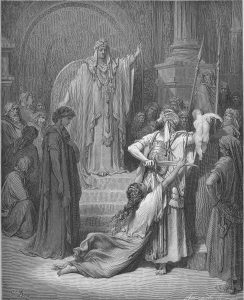Today we continue with the posts about the ‘Korbanot’ {קרבנות} (Hebrew for sacrifices) and will discuss ‘Korban Chata’at.{קרבן חטאת}
The translation to English of ‘Korban Chata’at’ {קרבן חטאת} is a ‘sin offering.’ The Hebrew word ‘Chet’ {חטא} (pronounce like the eighth Hebrew letter) is ‘sin’ and it comes from the Hebrew verb ‘Le-hach’tee’ {להחטיא} which means ‘to miss.’ In other words, according to the ‘Hebrew logic’, when a person sins he ‘misses’ his true purpose in life.

‘Korban Chata’at’ (the ‘sin offering’) was the sacrifice that was used to make atonement for unintentional sins and by that it implies that sacrificing this offering was the first step to ‘going back on the right path.’
One of the most interesting things about this ‘Korban’ {קרבן} (sacrifice) is this offering was the one that the leader should have sacrificed in order to make atonement for his sins, as written in Leviticus:
“When a leader sins, doing unintentionally any one of all the things that by the commandments of the LORD his God ought not to be done, and realizes his guilt.” (Leviticus 4:22)
The original Hebrew word for a ‘leader’ is ‘Nassi’ {נשיא} which actually means ‘president.’ The fascinating lesson that the Torah teaches us is that ‘a president’ – meaning the head of a state – is NOT by any circumstances above the law and if he did wrong – even unintentionally – he must make amends for what he did in order to fix it and go back on the right path.
